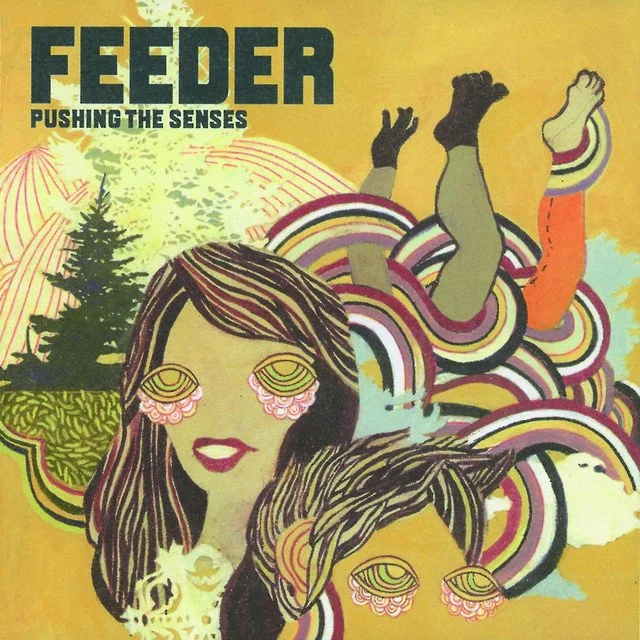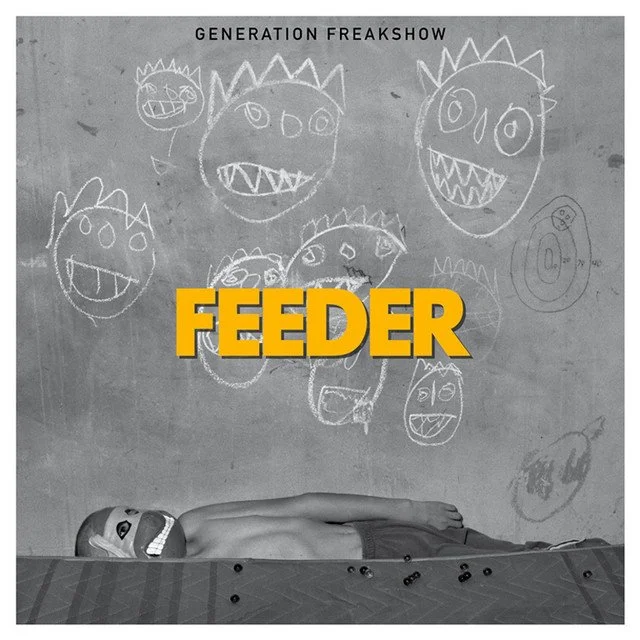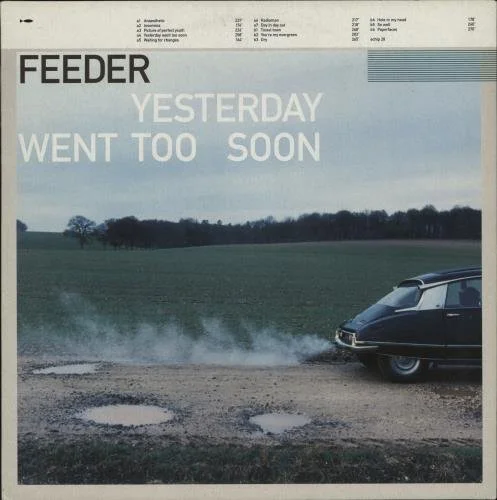Feeder: Ranking The Albums
Feeder are one of Britain’s best-ever exports, formed in the mid-90s and still going strong. We take a deep dive into each of their stellar albums, ranking them in order of greatness and listing key tracks. Scroll down to find out which record made Number One, and let us know what you think! Check out this playlist too, which All Things Rock believe goes beyond Spotify’s recommendations and is the best way to discover Feeder!
It says a lot about a band when their ‘worst’ album still has several knock-out tracks that other bands would kill for.
The only real problem with Silent Cry is its inconsistency. ‘We are the People’, ‘Miss You’ and the title track are confident, powerful tunes, and ‘Who’s the Enemy’ has an urgency and sense of danger that demands repeated listens… but overall the album lacks cohesion and it can be a challenge to digest the whole thing in one sitting.
By the time you reach the saggy mid-section of ‘Fires’, ‘Heads Held High’ and ’08:18’ it is hard to escape the feeling that Feeder were running out of ideas.
Interestingly, this record was their last with Mark Richardson, who took over the drumming responsibilities after the tragic loss of Jon Lee in 2002. By no means is this a bad record - but it probably shouldn’t be your starting point if you are new to Feeder.
Standout tracks: ‘Who’s the Enemy’, ‘Miss You’
Following the lukewarm reception to Silent Cry, it seemed that Feeder’s momentum had stalled in the late 00s.
Perhaps they felt the same way, because when Renegades was released it was initially promoted as a ‘new’ band, not Feeder. Perhaps one catalyst was moving away from The Echo Label for the first time, alongside Mark Richardson’s departure (drum duties were shared between Karl Brazil and Tim Trotter). By originally calling the new band ‘Renegades’, this was an indication that they no longer wanted to play the hits live.
Whatever the underlying motivations for the shift, they certainly came back with a vengeance, and a renewed energy. ‘White Lines’, ‘Sentimental’ and ‘Call Out’ all built on the urgency from ‘Who’s the Enemy’, with massive riffs, big guitars and next to none of the balladry that had taken up a large chunk of ‘Pushing the Senses’ and ‘Comfort in Sound’. Feeder sounded dangerous again, and their preference for playing smaller venues meant they were able to re-engage with a lot of their core fanbase who may have become disillusioned through the ‘stadium years’ of 2002 - 2005.
While it was a surprising and refreshingly unhinged collection, ‘Renegades’ can feel a little one-dimensional - and it is curious that the standout song, ‘Down to the River’, is actually the album’s lightest moment.
Standout tracks: ‘Down to the River’, ‘Home’
Everyone was rooting for Feeder in the early 2000s.
It took guts and determination to work through a loss as tragic as the suicide of Jon Lee (not only an incredible drummer, but an all-round nice guy who brought so much charm to Feeder’s early performances), and to create an album as poignant and timeless as ‘Comfort in Sound’. This show of resilience, coupled with song after song after song of such high quality, meant that Feeder’s early fans were proud of them, and newer fans had something that offered more emotional heft than any rock music coming across the Atlantic (with the possible exception of Jimmy Eat World).
So, we were all excited to hear about the Comfort in Sound follow-up, ‘Pushing the Senses’. Unfortunately, someone somewhere decided to lead with ‘Tumble and Fall’, a song so ploddy and turgid that the Grant Nicholas of 1998 wouldn’t even have kept it as a b-side. It features one of the most pointless guest appearances of all time (Travis’ Fran Healy mumbling some dull ‘Yeah yeah yeah’s) and, unfortunately, set the tone for an album that is mostly based around ballads and brooding, piano-based rock.
‘Pushing the Senses’ has, admittedly, aged well, with some of the gentler tracks ‘Dove Grey Sands’ and ‘Tender’ gaining impact over time. It is just a shame that ‘Tumble and Fall’ was used as the main promo for the record, as there are some far better songs here.
Of course, opener ‘Feeling a Moment’ is easily one of the best songs that Feeder have ever released, and one that they continue to play live to this day.
Standout tracks: ‘Morning Life’, ‘Feeling a Moment’
Several of Feeder’s early b-sides are better than their album tracks.
It is almost embarrassing to see a list of songs as strong as ‘Can’t Dance to Disco’, ‘Tomorrow Shine’, ‘Undivided’, ‘Here in the Bubble’, ‘Space Age Hero’ and several others, and to think they were all overlooked for inclusion on their companion albums.
‘Picture of Perfect Youth’ is a cracking 2-disc compilation album that showcases some of Grant Nicholas’ most creative and carefree songwriting.
It loses points for two reasons. Firstly, the uneven tracklisting (‘Emily’ is a disappointing opener, and tracks 4-8 are all ballads); and secondly, the exclusion of key b-sides such as ‘Waterfall’, ‘Rush’, ‘Sex Type Drug’, ‘San Diego’, ‘Don’t Bring Me Down’ and ‘I Need a Buzz’ which would have made for a more complete listen.
Instead we get a lacklustre cover of ‘The Power of Love’, which should probably have been left on the cutting room floor. Otherwise, ‘Picture of Perfect Youth’ is still well worth your time.
Standout Tracks: ‘Slowburn’, ‘Tomorrow Shine’, ‘Living in Polaroid’
There is a strangely ‘swampy’ vibe to the production of this album, giving it a unique quality not unlike Arctic Monkeys’ ‘Humbug’ or Queens of the Stone Age’s ‘Lullabies to Paralyse’ - in tone, at least.
Song-wise, there is some fairly standard (i.e. decent, if unspectacular) mid-period Feeder material in ‘Geezer’ and ‘Paperweight’, which don’t quite maintain the quality of the absolute gut-punch of the first 2 songs, ‘Universe of Life’ and ‘Eskimo’ (the best example of the ‘swampy’ sound).
Best of all are the brooding ‘Infra-red / Ultraviolet’, a tremendous showcase of Grant Nicholas’ songwriting, and slow-burning closer ‘Another Day on Earth’ (which was used as the opener on this album’s tour cycle).
Overall, ABE is a slightly patchy record, with some unremarkable and interchangeable tracks in its second half that dampen the effect of some of Feeder’s finest, most unique and experimental songs in the first.
Standout tracks: ‘Eskimo’, ‘Infra-Red / Ultraviolet’
Now we’re getting into Feeder’s most solid, consistent albums, where any album ranking list could fluctuate on a daily basis depending on the listener’s mood. ‘
Generation Freakshow’ disappeared quite quickly, with little fanfare, which is a shame because it is a fantastic record that seemed to suffer more from insufficient promotion rather than lack of quality. ‘Generation Freakshow’ has an energy that has echoes of Foo Fighters’ ‘The Colour and the Shape’, starting with the major-key ‘Oh My’ and moving through the bounce of ‘Borders’ (which could almost be ‘Buck Rogers’ part 2) and ‘In All Honesty’.
In fact, the only slightly jarring moment comes in ‘Hey Johnny’, which is a brilliant song in isolation, but its painful themes of loss and grief come somewhat out of the blue in the context of the songs around it. ‘Hey Johnny’ rocks and has a lyrical poignancy that demands the listener’s attention, but perhaps it is on the wrong album.
Overall, ‘Generation Freakshow’ seemed to be the best statement of intent that Feeder could have put out in 2012, with solid songwriting, strong production and a mature nod to ‘Echo Park’.
Standout tracks: ‘Children of the Sun’, ‘Borders’
Song-for-song, there honestly isn’t a great deal between Generation Freakshow and Tallulah for quality. What gives Tallulah the slight edge is its masterful combination of whimsy and power.
In many ways, Tallulah was Feeder’s freshest-sounding album since Echo Park, with some tracks that were lighter and more carefree than they had made in years (‘Daily Habit’, ‘Youth’, ‘Fear of Flying’) and which also avoided the novelty feel of ‘Seven Days in the Sun’.
Personnel-wise, Feeder had settled into a solid live unit with the Tommy Gleeson on guitar and Geoff Holroyde on drums. Even if these musicians weren’t part of the studio recordings, there is an energy about ‘Tallulah’ that suggests Grant and Taka were thinking about how these songs would translate in a live setting.
Tellingly, ‘Kyoto’, ‘Fear of Flying’ and ‘Youth’ remain solid staples of the set, a few years on, while the same cannot be said of ‘Generation Freakshow’ and ‘All Bright Electric’.
Standout tracks: ‘Fear of Flying’, ‘Blue Sky Blue’
i.e. The one with ‘Buck Rogers’.
Novelty lyrics aside, there are several reasons why ‘Buck Rogers’ is one of Feeder’s best-loved tunes. It is a perfect pop song. The timing was spot on, just at the point when spiky guitars and right-on-the-click-track drums were leading the charge in nu-metal and pop-punk. It was American enough for the US market, and English enough for the European market; and the optimism of the chorus “I think we’re gonna make it” is infectious.
‘Echo Park’ had other brilliant hits too, in ‘Seven Days in the Sun’, ‘Turn’, ‘Piece by Piece’ and ‘Just a Day’ (which was originally a ‘Seven Days in the Sun’ b-side that was so well received that it was re-released as a single towards the end of the album cycle).
Outside of the singles, Echo Park features the masterpiece ‘Satellite News’ (possibly too long to have been a hit, but easily one of most Feeder fans’ favourite songs), the Police-esque ‘Tell All Your Friends’, and grin-inducing ‘We Can’t Rewind’.
It is only the gratingly digital distortion in ‘Standing on the Edge’, ‘Under the Weather’ and ‘Bug’ that lets the side down. Otherwise, ‘Echo Park’ is an Atlantic-spanning triumph.
Standout tracks: ‘Satellite News’, ‘Buck Rogers’
Ok, so Swim wasn’t originally a full-length album, but an EP that came out in 1996, before Polythene, and contained some of Polythene’s tracks (Stereo World, Descend and Change).
This list is referring to the ‘Re-Surfaced’ version of Swim, released after the success of ‘Echo Park’, turning the EP into a full-length album by adding some of the best b-sides from the Polythene area.
The end result was so strong that the full-length LP almost matches Polythene for overall quality.
‘World Asleep’ features a chorus that deserves to be yelled from a mountain top. The opening riff of ‘Women in Towels’ (WIT) beats anything by Smashing Pumpkins, and ‘Swim’, ‘Elegy’ and ‘Forgiven’ all demonstrate the tender, delicate songwriting that Feeder would develop further on ‘Yesterday Went Too Soon’.
A lesser-known record that shows Feeder’s undeniable quality.
Standout tracks: ‘WIT’, ‘World Asleep’
Trying to choose between Black/Red and Torpedo is a futile exercise, given how similar they are in sound.
In many ways, the 2 + 1 albums could be viewed as a trilogy, as many of the tracks were conceived in a similar time period and were developed in a similar way in Grant’s home studio during the covid pandemic.
The only reason for putting Torpedo above Black/Red is that Black/Red misses a trick with its ‘double album’ packaging.
Other double albums such as ‘Melon Collie and the Infinite Sadness’ (Smashing Pumpkins), ‘The Wall’ (Pink Floyd), ‘Opposites’ (Biffy Clyro) and ‘Blinking Lights and Other Revelations’ (Eels) use the longer 2-part format to indulge different ideas or introduce a story.
Black/Red doesn’t take the opportunity to have repeating motifs, linking passages or a narrative arc. It is simply a collection of good songs that it is too long to fit on one disc. The tunes themselves are superb, and almost every one could be a hit.
Standout tracks: ‘Here Comes the Hurricane’, ‘Soldiers of Love’, ‘ELF’
As above, there is little to distinguish ‘Torpedo’ from ‘Black/Red’ because the production is so similar and the songwriting is so consistently strong.
‘Black/Red’ is being marked down for not making more of the double-album format, which logically puts Torpedo above it.
If anyone ever said Feeder “aren’t as good as they used to be”, they need to hear this record. From the triumphant opener ‘The Healing’, through the heavy riffage of ‘Decompress’ and ‘Magpie’, to the dark, brooding climax of ‘Submission’, ‘Torpedo’ is one of the best British exports of the 20s so far.
What’s more, the chorus and bridge of ‘When It All Breaks Down’ bring to mind the spine-tingling moments of Biffy Clyro’s best work. The anthemic ‘Born to Love You’ would have been one of the best songs on ‘Comfort in Sound’. And if you love early Feeder’s focus on heavy riffs (‘Stereo World’, ‘WIT’ etc) you’ll love ‘Magpie’, ‘Torpedo’ and ‘Wall of Silence’.
If we ever have another global pandemic, at least we know it will lead to some good Feeder songs.
Standout tracks: ‘When It All Breaks Down’, ‘Torpedo’, ‘Born To Love You’
One of the most impressive things about ‘Comfort in Sound’ is that it is so well-rounded, and celebrates every kind of human emotion, not just sadness.
After the tragedy of losing Jon Lee, no-one would have blamed Feeder for choosing not to continue at all; and an album called “Comfort in Sound” would have been forgiven if it was entirely focused on grief.
Surpassing all expectations, in many ways they became an even better band with this album.
Grant’s songwriting is top-tier, from the glorious opener “Just The Way I’m Feeling” through the belter “Come Back Around”, to the riff-heavy “Godzilla” and the stirring strings of “Forget About Tomorrow”.
There are a couple of missteps, with “Summer’s Gone” coming across as lacklustre and “Quick Fade” hiding its undercooked writing beneath unnecessary effects. But overall, especially given the circumstances, this is a beautiful, heartfelt album with songs that are built for stadiums, with some moments that are devastating, and others euphoric.
Standout tracks: ‘Just The Way I’m Feeling’, ‘Forget About Tomorrow’, ‘Moonshine’
The fact that YWTS was voted ‘Album of the Month’ in Metal Hammer magazine speaks volumes about Feeder’s multi-faceted appeal.
With this second full-length release, Feeder outgrew the Smashing Pumpkins comparisons and introduced a Brit-rock grit to their sound (think Manic Street Preachers, but heavier).
With visuals designed to look like stills from an art-house movie, and with the track titles and lengths (in seconds, not minutes) printed on the front cover, this was clearly an album that was painstakingly and thoughtfully compiled.
It speaks volumes that some of Feeder’s best-ever b-sides (‘Tomorrow Shine’, ‘Can’t Dance to Disco’ and “I Need a Buzz’) came from these sessions and still couldn’t fit on the record.
With all its hard rock (‘Insomnia’, ‘Waiting For Changes’, ‘Hole in My Head’, ‘Day in Day out’), there is actually a lot of balladry on YWTS, from the title track to ‘Dry’, ‘Tinseltown’, ‘Radioman’ and ‘Paperfaces’ (which was admittedly better in its re-recorded single form), giving the album as a whole a well-rounded, sophisticated variety that makes for a wholly enjoyable, life-affirming experience.
Soundout tracks: ‘Insomnia’, ‘So Well’, ‘Yesterday Went Too Soon'
Was there any better album released in 1997?
With a youthful energy, thick multi-layered guitars, catchy melodies and a perfect balance of heavy and soft, ‘Polythene’ remains Feeder’s crowning glory and one of the best examples of mid-90s post-grunge / Brit-rock / indie-rock, or whatever you want to call it.
Yes, there is a clear Smashing Pumpkins influence that is impossible to deny, but ‘Polythene’ leaves a lasting impression that arguably surpasses anything that Billy Corgan and crew have produced.
‘Polythene Girl’ sets the tone well, building gradually rather than smashing the listener with heaviness right out of the gate.
‘My Perfect Day’ remains one of Grant’s best-ever songs, and there is a brooding and menacing atmosphere in the verses that comes back at other points through ‘Descend’, ‘Radiation’ and ‘Stereo World’.
All of the singles from this record are superb, 3-minute pop songs, including ‘Crash’, ‘Tangerine’ and ‘Cement’.
And then, of course, there is ‘High’, which was added to the re-release of the album, with an impeccable placement in the track listing as a replacement for the original ‘Waterfall’. A whimsical, elegiac ode to spending quality time with friends, ‘High’ is relatable to anyone, whether or not you might indulge in anything illegal as part of the experience.
The B-sides from this era are stunning too, including ‘Here in the Bubble’ and ‘Undivided’, emphasising just how good Feeder were right at the very start. Essential.
Standout tracks: ‘High’, ‘Descend’, ‘My Perfect Day’














